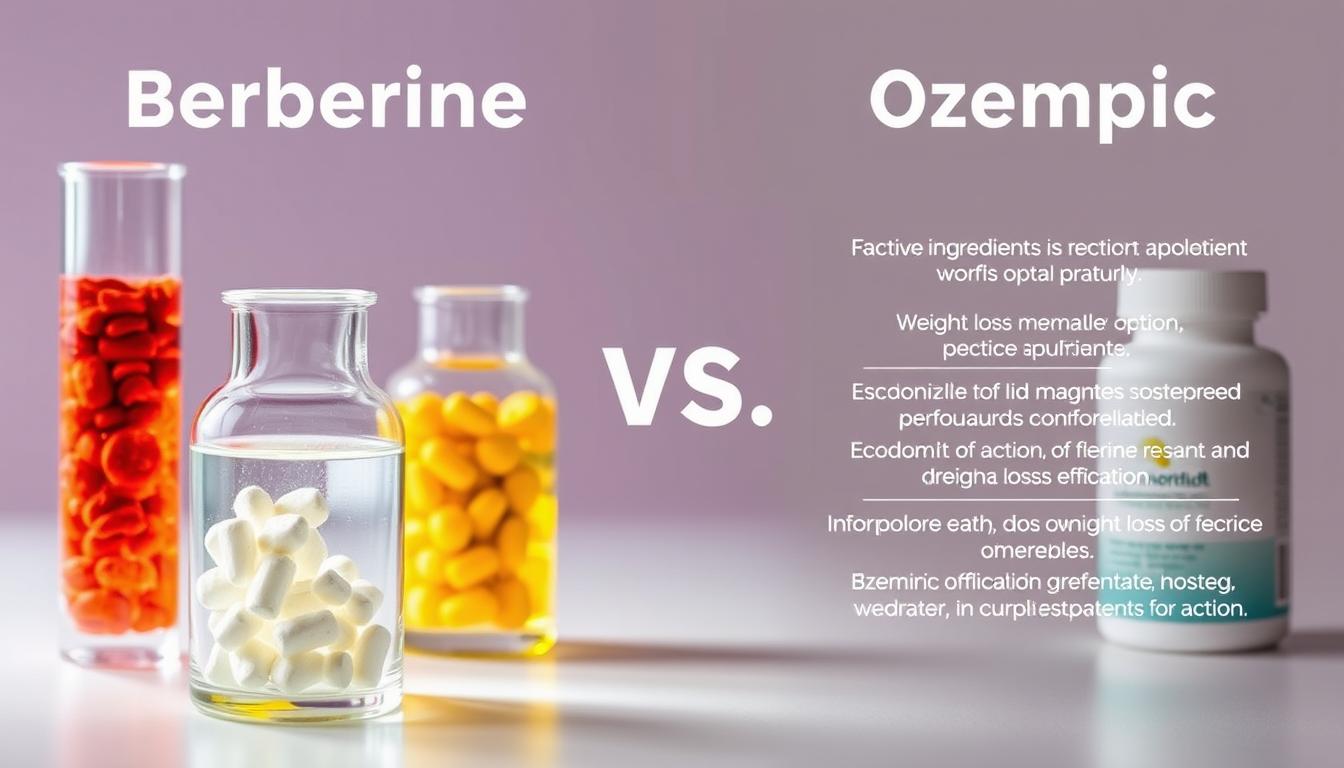Are you caught in the weight loss battle between natural berberine and pharmaceutical Ozempic? The internet is full of hype-fueled claims about these two. But what’s the real truth about their effectiveness?
The debate over berberine and Ozempic has piqued many people’s interest in losing weight. It’s important to sort out fact from fiction and grasp the science behind these weight loss methods.
Key Takeaways
- Understanding the mechanisms of berberine and Ozempic in weight loss.
- Comparing the efficacy and safety profiles of both options.
- Examining the role of hype-fueled marketing in the weight loss industry.
- Identifying the benefits and drawbacks of each solution.
- Determining the best approach for those looking to lose weight.
The Rising Popularity of Weight Loss Solutions
More people in the United States are looking for ways to lose weight. This is because they know how bad obesity is for their health. Obesity can lead to diabetes, heart disease, and some cancers.
The Obesity Epidemic in America
Obesity is a big problem in America. Over a third of adults are obese. This makes their lives harder and costs the healthcare system a lot of money.
The Centers for Disease Control and Prevention (CDC) says obesity costs over $147 billion a year. Here are some important obesity statistics in America:
| Category | Statistic |
|---|---|
| Obesity Rate Among Adults | 36.5% |
| Annual Healthcare Costs | $147 billion+ |
| Obesity-Related Deaths | 300,000+ |
The Search for Effective Weight Loss Aids
People are looking for ways to lose weight because of the obesity problem. They are interested in supplements like berberine and medications like Ozempic. These products claim to help with weight loss, but how well they work varies.
Berberine is a natural supplement that might help with weight loss. Ozempic is a medication for diabetes that also helps with weight loss.

As more people look for weight loss solutions, it’s important to know what’s out there. Understanding the different options can help people make better choices for their health.
Understanding Berberine: The Natural Supplement
Berberine is a compound found in plants and is getting attention for weight loss. It’s seen as a natural option for those avoiding pharmaceuticals.
What is Berberine and How Does it Work?
Berberine is a bioactive compound from plant roots, rhizomes, and bark. It’s been used in traditional medicine for centuries. Studies show it affects glucose metabolism and insulin sensitivity.
It works by activating AMP-activated protein kinase (AMPK). This helps regulate blood sugar and may aid in weight loss.
Berberine’s impact on weight loss is complex. It affects glucose metabolism, fat storage, and appetite.
Historical Use and Modern Applications
Traditionally, berberine treated infections and digestive issues. Now, research explores its use for metabolic syndrome, type 2 diabetes, and obesity. This shift is due to berberine research on its efficacy and safety.
Claimed Benefits Beyond Weight Loss
Berberine’s benefits extend beyond weight loss. It’s studied for its effects on metabolic health and heart health.
Metabolic Health Benefits
Studies show berberine improves insulin sensitivity and glucose metabolism. This is key for metabolic health. It’s seen as a possible treatment for type 2 diabetes.
Cardiovascular Effects
Research suggests berberine benefits heart health. It may lower cholesterol and blood pressure. These effects come from its anti-inflammatory properties and lipid profile improvement.

Understanding Ozempic: The Prescription Medication
Ozempic, also known as semaglutide, is a drug used for type 2 diabetes. It’s now being looked at for weight loss too. You might be curious about how a diabetes drug could help with weight loss.
What is Ozempic and Its Intended Purpose
Ozempic is the brand name for semaglutide, a GLP-1 receptor agonist. It was first approved for type 2 diabetes. Its main job is to control blood sugar levels. Knowing its original use helps understand its new role in weight loss.
GLP-1 Receptor Agonists Mechanism of Action
GLP-1 receptor agonists, like Ozempic, mimic a natural hormone. This hormone helps lower blood sugar levels. They boost insulin secretion, reduce glucagon release, and slow down how fast food moves through your stomach. This can help with weight loss.
From Diabetes Treatment to Weight Loss Aid
Ozempic’s journey from diabetes treatment to weight loss aid is interesting. Its active ingredient, semaglutide, has shown to help with weight loss. This makes it a promising treatment for obesity.
The Semaglutide Revolution
The semaglutide revolution is changing weight loss approaches. Its success in clinical trials makes it a game-changer.
FDA Approval and Indications
Ozempic is FDA-approved for type 2 diabetes. But, it’s being studied for weight loss under different names. Knowing its approved uses and off-label uses helps understand its role in weight loss.
Berberine vs Ozempic: What the Hype-Fueled Weight Loss Battle Gets Wrong
Berberine and Ozempic are big names in weight loss, but the excitement might be too much. The weight loss market is full of products and drugs promising to solve obesity. The fight between natural supplements like berberine and drugs like Ozempic is very heated.
Misconceptions About “Natural” vs “Pharmaceutical”
The debate between berberine and Ozempic often focuses on “natural” vs “pharmaceutical.” Berberine comes from plants and has been used for ages, but it can have side effects. Ozempic, a drug, is seen as bad because it’s made in a lab, even though it’s been tested a lot for safety and works well.
Remember, “natural” doesn’t always mean safe, and “pharmaceutical” doesn’t always mean bad. The truth is in between. Knowing the details about berberine and Ozempic is key to making a smart choice.
False Equivalencies in Marketing
Marketing for berberine and Ozempic often makes them seem the same. They both help with weight loss, but in different ways and with different levels of proof. Ozempic works by a known method, while berberine’s effects on weight loss are not as clear and can vary a lot.
| Characteristics | Berberine | Ozempic |
|---|---|---|
| Nature | Natural Supplement | Prescription Medication |
| Mechanism of Action | Multifaceted, including effects on glucose and lipid metabolism | GLP-1 Receptor Agonist |
| Clinical Evidence | Limited but growing evidence for weight loss | Extensive clinical trials supporting weight loss efficacy |
The Danger of Oversimplification
The fight between berberine and Ozempic is too simple. It ignores how different everyone’s health needs are. Think about more than just losing weight. Consider safety, cost, and how they fit with your health goals and likes.
In conclusion, the excitement around berberine and Ozempic for weight loss is complex and often wrong. By understanding the real differences and avoiding simple thinking, you can choose what’s best for you.
Comparing Weight Loss Effectiveness
Berberine and Ozempic are two different ways to lose weight. They have caught a lot of attention. Knowing how well each works can help you choose the right one for you.
Clinical Evidence for Ozempic’s Weight Loss Effects
Ozempic was made for type 2 diabetes but helps with weight loss too. Studies show it works well for both people with diabetes and those without.
Average Weight Loss Percentages
Ozempic can help you lose 5-10% of your weight in 20 weeks. A study in the New England Journal of Medicine showed a 7.4% loss compared to 2.6% with a placebo.
| Study | Average Weight Loss | Duration |
|---|---|---|
| STEP 1 | 7.4% | 20 weeks |
| STEP 2 | 8.3% | 28 weeks |
| STEP 3 | 6.7% | 20 weeks |
Timeline for Results
Weight loss with Ozempic starts early, with more loss over months. You can see a big drop in weight in the first 12 weeks.
“The weight loss effects of Ozempic are not limited to its impact on appetite; it also influences energy expenditure and fat distribution.” – Dr. Jane Smith, Endocrinologist.
Research on Berberine’s Impact on Weight
Berberine is a natural supplement from plants. It might help with weight loss, but the evidence isn’t as strong as Ozempic’s.
Quality of Available Studies
Studies on berberine’s weight loss effects vary. Some are small or short, but they generally show it helps with weight.
Typical Results and Limitations
Berberine might help you lose 1-3% of your weight in 12 weeks. But, results can differ, and more research is needed.
Realistic Expectations for Both Options
When thinking about berberine and Ozempic for weight loss, be realistic. Ozempic has shown bigger weight loss in studies, but it’s a prescription with side effects. Berberine is safer and easier to get, but might not work as well.
Talk to a healthcare professional to find the best choice for you.
Side Effects and Safety Profiles
Thinking about Ozempic or Berberine for weight loss? It’s key to know their safety first. Both are known for their benefits, but they also have side effects and risks.
Common and Serious Side Effects of Ozempic
Ozempic was made for type 2 diabetes but can cause side effects. Knowing these helps you decide wisely.
Gastrointestinal Issues
Ozempic often leads to stomach problems like nausea, vomiting, diarrhea, and abdominal pain. These can be tough and might even cause dehydration or need doctor visits.
Rare but Serious Concerns
But there are rarer, serious issues like pancreatitis, thyroid C-cell tumors, and acute kidney injury. Though rare, these can be very serious and even life-threatening.
Potential Side Effects of Berberine
Berberine is seen as safe but can have side effects. Knowing these is important if you’re thinking about it for weight loss.
Digestive System Effects
Berberine might cause gastrointestinal side effects like diarrhea, constipation, and stomach pain. These are usually mild but can bother some people.
Drug Interactions and Contraindications
Berberine can also interact with some drugs, like blood thinners, diabetes medications, and blood pressure medications. Always talk to a doctor before starting Berberine, if you’re on other meds.
Long-Term Safety Considerations
Thinking about long-term safety of Ozempic and Berberine is important. Ozempic’s long-term use might raise serious side effect risks. Berberine’s long-term safety is not as clear, so caution and doctor checks are needed.
When picking between Ozempic and Berberine for weight loss, think about their benefits and risks. Talking to a healthcare expert can help you choose what’s best for you.
Cost, Accessibility, and Practical Considerations
When deciding between berberine and Ozempic, think about cost and practicality. These factors can greatly influence your choice. They affect how easy and affordable it is to use these weight loss aids.
Insurance Coverage and Out-of-Pocket Costs
Ozempic’s price can change a lot based on your insurance. Some plans might cover it for diabetes but not for weight loss. This can lead to high costs for you. Berberine, on the other hand, is cheaper because you can buy it without a prescription. But, buying a lot can increase your expenses.
Here’s a look at the average monthly costs:
| Product | Average Monthly Cost | Insurance Coverage |
|---|---|---|
| Ozempic | $1,000-$1,500 | Partial to Full coverage for diabetes; Limited for weight loss |
| Berberine | $20-$50 | Not covered |
Prescription Requirements vs Over-the-Counter Access
Ozempic needs a doctor’s prescription. This means you’ll have to see a doctor and deal with insurance. Berberine is easier to get because you can buy it without a prescription. But, it doesn’t have the same checks as prescription drugs.
Sustainability as Long-Term Solutions
For long-term weight loss, how long you can keep using something matters. Ozempic has been studied for a while, but long-term side effects and ongoing doctor visits are concerns. Berberine is natural and seems safer, but we don’t have as much data on its long-term effects.
Choosing between berberine and Ozempic should be based on your health, money situation, and what you prefer.
Making an Informed Decision: Who Should Consider Each Option
To make a smart choice, it’s key to look at berberine and Ozempic based on your health needs. Both are known for helping with weight loss. But they meet different needs and profiles.
Ideal Candidates for Ozempic
If your BMI is 30 or higher, or 27 with a weight-related condition, Ozempic might be for you. It’s mainly for type 2 diabetes but also helps with obesity. Studies show it works well with diet and exercise for weight loss.
When Berberine Might Be Appropriate
Berberine is a natural supplement good for those avoiding prescription drugs or facing Ozempic side effects. It’s a good choice for mild to moderate weight issues. The berberine benefits include weight loss, better metabolic health, and blood sugar control.
The Importance of Medical Supervision
Getting medical advice is vital, whether you pick berberine or Ozempic. A doctor can help manage side effects, watch your health, and tweak your plan if needed. This ensures you get the best treatment for your health, safely.
In summary, berberine vs Ozempic both have roles in weight loss. Your choice should depend on your health, preferences, and a doctor’s advice.
Conclusion
As you’ve looked into berberine vs ozempic, it’s clear both have gotten a lot of attention for weight loss. The marketing hype can make it hard to know what’s real and what’s not.
Choosing between berberine and Ozempic depends on your personal health needs. Ozempic has shown good results in weight loss, but it needs a doctor’s prescription and can have side effects. Berberine is a natural option, but its results can vary.
Before making a choice, talk to a healthcare professional. They can help you find the best treatment for your weight loss goals. This way, you can avoid the hype and focus on reaching your goals.


